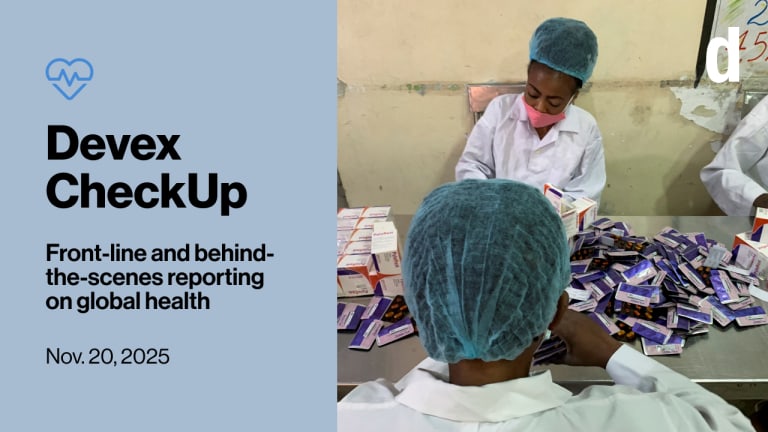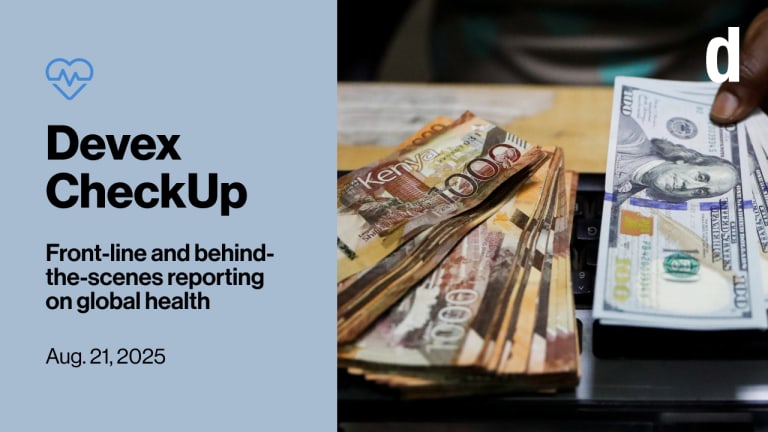
This week, an independent commission released a damning report on sexual exploitation and abuse allegedly committed by World Health Organization workers in the Democratic Republic of Congo. The report identified 83 people accused of sexual abuse, including at least 21 WHO doctors, consultants, and senior staffers — both national and international — during the 2018-2020 Ebola response.
This is a preview of Devex CheckUp
Sign up to this newsletter for exclusive global health news and insider insights, in your inbox every Thursday.
WHO Director-General Tedros Adhanom Ghebreyesus apologized to more than 50 women accusers, saying he takes “ultimate responsibility” for the behavior of the agency’s aid workers, and vowed to both hold perpetrators to account and address WHO’s shortcomings.
• “A few words to say ‘sorry’ don't cut it,” Asmita Naik, an international human rights consultant and longtime advocate for victims of sexual exploitation, tells Jenny. “There must be consequences.” She argues that WHO should see a loss of funding, with donors diverting funds to organizations “who do better.”
• Others call for more ways of holding WHO accountable, including increasing the number of its female staff. Of the 2,800 WHO staffers deployed in DRC during the response to its 10th Ebola outbreak, over 73% were men. Men also held 77% of leadership roles.
• Roopa Dhatt, executive director at Women in Global Health, says it is now time to penalize guilty parties, strengthen prevention measures, and implement a survivor-centered approach, including reparations for the women alleging abuse.
• WGH is also set to co-host a series of town halls with WHO to discuss the drivers of sexual exploitation and abuse, as well as institutionalizing organizational culture change.
+ What do you think will help improve WHO’s response? We would like to hear from you.
ICYMI: We have an ongoing #AidToo investigation.
Learning their lesson
A groundbreaking ceremony took place for WHO Academy in Lyon, France, this week. Here’s what we know so far:
• Tedros first mentioned the idea of a WHO Academy providing training to 10 million public health professionals globally, as well as learning opportunities for agency staffers, back in 2019.
• The academy will offer programs to health workers and those in related fields — such as public health officials, educators, and policymakers — in person and online. After opening the physical campus in 2024, the academy will feature a health emergency simulation center for training on mass casualty events and disease outbreaks. Work is also underway for game-based learning using “augmented reality” technology. Regional hubs will also be established using existing health institutions.
• The academy, which will offer more than 100 major learning programs by 2023 and “digital credentials,” will be headed by Dr. Agnès Buzyn, who serves as the director-general’s envoy for multilateral affairs at WHO.
Your next job?
Health Development Officer
U.S. Agency for International Development
United States
• IntraHealth International President and CEO Polly Dunford welcomes the investment in training the health workforce worldwide through the academy but tells Jenny “much more is needed,” including investments in “surge capacity; fair compensation for all health workers, including women and community health workers; mental health resources to address burnout; and real elevation for nurses.”
Road map on meningitis

The African continent’s “meningitis belt” includes 26 countries prone to outbreaks — such as DRC, where nearly 200 people have died in the latest spate of cases.
While vaccines are available that target the major organisms causing meningitis, progress on its reduction has been slower than that for other vaccine-preventable diseases. WHO is trying to change that. This week, the agency launched the first global road map for countries to reduce cases of the disease — with a strategy that leans heavily on ramping up vaccination.
“This is a road map, and we must make absolutely sure we don’t lose our way on this road,” said Mike Ryan, executive director at WHO’s Health Emergencies Programme.
Read: Progress on vaccinating against meningitis is too slow, says WHO
One big number
22%
—That’s the percentage of children from the target 115,000 with multidrug-resistant tuberculosis who will be treated by December 2022, according to a new report. The Stop TB Partnership estimates that at least 1.2 million fewer people may be diagnosed and treated for the disease in 2021 compared with 2020.
Read more: 2021 may be worse for tuberculosis
Liberté, egalité, vacciné
“Often [COVID-19 vaccines arrive] very late, nobody knows what price has been paid to pharmaceutical labs per dose, and ... some companies are making profits, and that is not part of the values we defend.”
— French President Emmanuel MacronAt this week’s ceremony for WHO Academy, Macron defended Europe’s record on exporting vaccines but called for better technology transfers and local manufacturing capacity around the world.
Read more: Emmanuel Macron: More transparency needed on COVID-19 vaccines
What we’re reading
Doses of Cuban COVID-19 vaccine Abdala have been shipped to Vietnam and Venezuela. [Al Jazeera]
Sanofi is no longer pursuing the development of a messenger RNA-based COVID-19 vaccine despite positive trial results because other developers have already captured the market. [Financial Times]
Zimbabwe’s vaccine mandate effectively forces many to get the jab, but critics say the government should first ensure an adequate supply for everyone. [The Associated Press]










